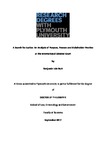A Search for Justice: An Analysis of Purpose, Process and Stakeholder Practice at the International Criminal Court
| dc.contributor.supervisor | Holden, Patrick | |
| dc.contributor.author | Nutt, Benjamin Iain | |
| dc.contributor.other | Faculty of Arts, Humanities and Business | en_US |
| dc.date.accessioned | 2018-01-10T16:17:58Z | |
| dc.date.issued | 2017 | |
| dc.identifier | 10114672 | en_US |
| dc.identifier.uri | http://hdl.handle.net/10026.1/10549 | |
| dc.description.abstract |
At the outset the International Criminal Court (ICC) was heralded as a revolution within international society, but it has since found itself at the centre of much controversy and debate. According to the Rome Statute’s Preamble, a broad aim of the ICC is: “to guarantee lasting respect for and the enforcement of international justice”. However, a review of the critical literature surrounding the ICC uncovered a noticeable lack of discussions applying theoretical understandings of justice to neither the Court’s design nor operations; a gap in the literature that the thesis aims to address. Moreover, the review identified that the primary concerns regarding the ICC’s performance all focussed on stakeholder practices. Combining these two observations, the thesis hypothesised that the controversies and issues facing the ICC emerged because the practice of the Court’s primary stakeholders has been incompatible with the demands of justice. In order to test this hypothesis, the thesis analyses the compatibility of the ICC with what the thesis identifies as the core theoretical demands of justice across three areas: purpose, procedure, and stakeholder practice. It does this by building a theoretical framework from the justice literature which is then used to analyse and critique data relating to the ICC’s purposes, procedures and stakeholder practices gathered from empirical observations, interviews, official documents and speeches. The thesis concludes that, for the most part, it is the practice of ICC stakeholders that have been incompatible with the demands of justice, not the Court’s purposes or procedures. | en_US |
| dc.language.iso | en | |
| dc.publisher | University of Plymouth | |
| dc.rights | Attribution-NonCommercial-NoDerivs 3.0 United States | * |
| dc.rights.uri | http://creativecommons.org/licenses/by-nc-nd/3.0/us/ | * |
| dc.subject | International Criminal Court | en_US |
| dc.subject | Justice | en_US |
| dc.subject | International Law | en_US |
| dc.subject | International Ethics | en_US |
| dc.subject | Global Governance | en_US |
| dc.subject | John Rawls | en_US |
| dc.subject.classification | PhD | en_US |
| dc.title | A Search for Justice: An Analysis of Purpose, Process and Stakeholder Practice at the International Criminal Court | en_US |
| dc.type | Thesis | |
| plymouth.version | publishable | en_US |
| dc.identifier.doi | http://dx.doi.org/10.24382/850 | |
| dc.rights.embargodate | 2019-01-10T16:17:58Z | |
| dc.rights.embargoperiod | 12 months | en_US |
| dc.type.qualification | Doctorate | en_US |
| rioxxterms.version | NA |
Files in this item
This item appears in the following Collection(s)
-
01 Research Theses Main Collection
Research Theses Main



